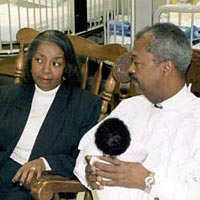
Ms. Barbara Tapp-Webb, Director of Volunteer Services, and Congressman Donald M. Payne (NJ-10), in Boarder Baby Nursery. Photo: Carlton E. Washington |
UMDNJ - "Border Babies"
Before the "boarder baby" phenomenon
received national media attention during the 1990s, the UMDNJ
(University of Medicine and Dentistry of New Jersey) University
Hospital was already building the foundation for what has become
its most successful volunteer program. Newark was one of the first
cities to experience on a large scale the problem of infants left
at hospitals, cleared for discharge, but with neither a parent nor
guardian available to take them home.
By 2000, University Hospital's Boarder Baby Program,
introduced in 1986, had exceeded expectations in helping abandoned
infants develop in as normal and caring an environment as possible
during their hospital stay. The program also benefits its volunteer
caregivers through feelings of satisfaction and appreciation.
The program was initiated in response to observations
by physicians and staff that babies "signed over" were not thriving
nor developing normally in the busy hospital environment where
lights never go out, there are no toys, nor much human contact for
cuddling. Some babies were not learning to sit up, some cried all
the time, others never cried. To help correct this problem, the
Boarder Baby program was created, led by Barbara Webb, in
association with the hospital administration, nursing services, the
National Association of Negro Business and Professional Women's
Clubs, and UH's Volunteer Services Department.
The program began in two hospital rooms, each
containing three cribs, with six volunteers who visited regularly
to hold, feed, and play with infants. Eight years later, the
program has its own nursery containing fourteen cribs and donated
toys, and with more volunteers. Volunteers have been hospital
staff, students from the affiliated medical school, and people of
all ages from high school students to grandparents. Some volunteers
have adopted the babies.
Many urban hospitals now have some type of boarder
baby program. The program has been important in generating public
attention, so that government action has been taken to address the
border baby problem.
Documentation includes 10 color photographs,
newspaper clippings, magazine articles, news releases, a TV news
segment script, and a congressional newsletter.
Originally submitted by: Donald M. Payne, Representative (10th District).
 More Local Legacies... More Local Legacies... |
|
|
|
The Local Legacies project provides a "snapshot" of American Culture as it was expressed in spring of 2000. Consequently, it is not being updated with new or revised information with the exception of "Related Website" links.
|